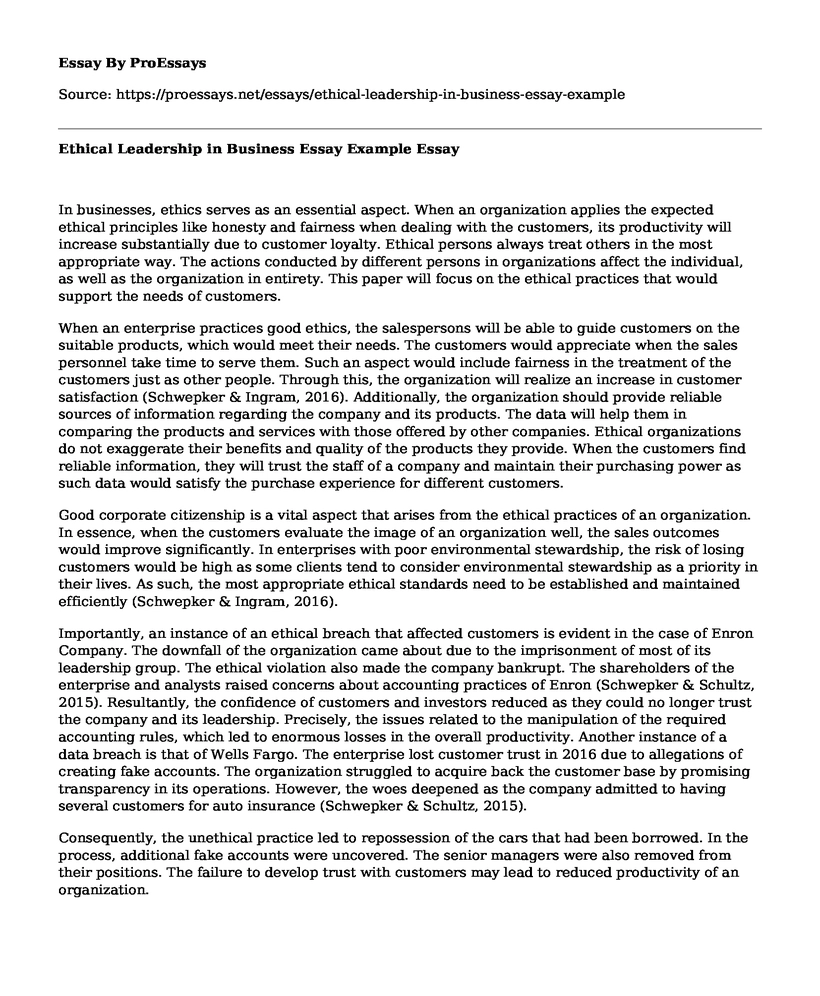In businesses, ethics serves as an essential aspect. When an organization applies the expected ethical principles like honesty and fairness when dealing with the customers, its productivity will increase substantially due to customer loyalty. Ethical persons always treat others in the most appropriate way. The actions conducted by different persons in organizations affect the individual, as well as the organization in entirety. This paper will focus on the ethical practices that would support the needs of customers.
When an enterprise practices good ethics, the salespersons will be able to guide customers on the suitable products, which would meet their needs. The customers would appreciate when the sales personnel take time to serve them. Such an aspect would include fairness in the treatment of the customers just as other people. Through this, the organization will realize an increase in customer satisfaction (Schwepker & Ingram, 2016). Additionally, the organization should provide reliable sources of information regarding the company and its products. The data will help them in comparing the products and services with those offered by other companies. Ethical organizations do not exaggerate their benefits and quality of the products they provide. When the customers find reliable information, they will trust the staff of a company and maintain their purchasing power as such data would satisfy the purchase experience for different customers.
Good corporate citizenship is a vital aspect that arises from the ethical practices of an organization. In essence, when the customers evaluate the image of an organization well, the sales outcomes would improve significantly. In enterprises with poor environmental stewardship, the risk of losing customers would be high as some clients tend to consider environmental stewardship as a priority in their lives. As such, the most appropriate ethical standards need to be established and maintained efficiently (Schwepker & Ingram, 2016).
Importantly, an instance of an ethical breach that affected customers is evident in the case of Enron Company. The downfall of the organization came about due to the imprisonment of most of its leadership group. The ethical violation also made the company bankrupt. The shareholders of the enterprise and analysts raised concerns about accounting practices of Enron (Schwepker & Schultz, 2015). Resultantly, the confidence of customers and investors reduced as they could no longer trust the company and its leadership. Precisely, the issues related to the manipulation of the required accounting rules, which led to enormous losses in the overall productivity. Another instance of a data breach is that of Wells Fargo. The enterprise lost customer trust in 2016 due to allegations of creating fake accounts. The organization struggled to acquire back the customer base by promising transparency in its operations. However, the woes deepened as the company admitted to having several customers for auto insurance (Schwepker & Schultz, 2015).
Consequently, the unethical practice led to repossession of the cars that had been borrowed. In the process, additional fake accounts were uncovered. The senior managers were also removed from their positions. The failure to develop trust with customers may lead to reduced productivity of an organization.
Conclusion
In conclusion, under a range of circumstances, the employees and management staff within an organization may commit ethical breaches. The personnel may also fail to treat customers well, which would drive most of the clients away. As such, it will be efficient to ensure honesty, fairness, integrity, and trustworthiness when dealing with customers to help increase the volume of sales.
References
Schwepker Jr, C. H., & Ingram, T. N. (2016). Ethical leadership in the salesforce: effects on salesperson customer orientation, commitment to customer value and job stress.
Journal of Business & Industrial Marketing, 31(7), 914-927. https://doi.org/10.1108/JBIM-07-2015-0136
Schwepker, C. H., & Schultz, R. J. (2015). Influence of the ethical servant leader and ethical climate on customer value enhancing sales performance. Journal of Personal Selling & Sales Management, 35(2), 93-107. https://doi.org/10.1080/08853134.2015.1010537
Cite this page
Ethical Leadership in Business Essay Example. (2022, Nov 07). Retrieved from https://proessays.net/essays/ethical-leadership-in-business-essay-example
If you are the original author of this essay and no longer wish to have it published on the ProEssays website, please click below to request its removal:
- Essay Example on Lieutenant Colonel Adam and His Leadership Style
- Dissertation on Life and Death
- Errors in the Problem-Solving Process Essay Example
- Sprint Compensation System Paper Example
- Keeshan Parekh's Unethical Behaviour: Trustworthiness & Disloyalty - Essay Sample
- Essay Sample on The Future of Product Marketing: Consumers in Control of Data
- Essay on Exploring the Meaning of Ethical Leadership: A Social Logical Approach







